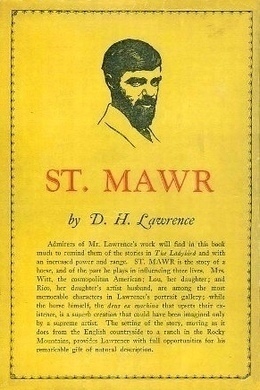
-
EPUB 210 KB
-
Kindle 294 KB
-
Support epubBooks by making a small $2.99 PayPal donation purchase.
This work is available for countries where copyright is Life+70 or less.
Description
The heroine of the story, Lou Witt, abandons her sterile marriage and a brittle, cynical post-First World War England. Her sense of alienation is associated with her encounter with a high-spirited stallion, the St Mawr whose name provides the title for this tale. She eventually settles in a remote ranch set high in the mountains of New Mexico, near Taos. Lawrence wrote most of this brief novel whilst spending five months of the summer of 1924 at what is now known as the D. H. Lawrence Ranch, a property which he and wife, Frieda, acquired from Mabel Dodge Luhan earlier that year.
229 pages with a reading time of ~3.50 hours (57321 words), and first published in 1925. This DRM-Free edition published by epubBooks, 2014.
Community Reviews
There are currently no other reviews for this book.
Excerpt
Lou Witt had had her own way so long, that by the age of twenty-five she didn’t know where she was. Having one’s own way landed one completely at sea.
To be sure for a while she had failed in her grand love affair with Rico. And then she had had something really to despair about. But even that had worked out as she wanted. Rico had come back to her, and was dutifully married to her. And now, when she was twenty-five and he was three months older, they were a charming married couple. He flirted with other women still, to be sure. He wouldn’t be the ‘handsome Rico if he didn’t. But she had ‘got’ him. Oh yes! You had only to see the uneasy backward glance at her, from his big blue eyes: just like a horse that is edging away from its master: to know how completely he was mastered.
She, with her odd little museau, not exactly pretty, but very attractive; and her quaint air of playing at being well bred, in a sort of charade game; and her queer familiarity with foreign cities and foreign languages; and the lurking sense of being an outsider everywhere, like a sort of gipsy, who is at home anywhere and nowhere: all this made up her charm and her failure. She didn’t quite belong.
Of course she was American: Louisiana family, moved down to Texas. And she was moderately rich, with no close relation except her mother. But she had been sent to school in France when she was twelve, and since she had finished school, she had drifted from Paris to Palermo, Biarritz to Vienna and back via Munich to London, then down again to Rome. Only fleeting trips to her America.
So what sort of American was she, after all?
And what sort of European was she either? She didn’t ‘belong’ anywhere. Perhaps most of all in Rome, among the artists and the Embassy people.
It was in Rome she had met Rico. He was an Australian, son of a government official in Melbourne, who had been made a baronet. So one day Rico would be Sir Henry, as he was the only son. Meanwhile he floated round Europe on a very small allowance–his father wasn’t rich in capital–and was being an artist.
They met in Rome when they were twenty-two, and had a love affair in Capri. Rico was handsome, elegant, but mostly he had spots of paint on his trousers and he ruined a neck-tie pulling it off. He behaved in a most floridly elegant fashion, fascinating to the Italians. But at the same time he was canny and shrewd and sensible as any young poser could be and, on principle, good-hearted, anxious. He was anxious for his future, and anxious for his place in the world, he was poor, and suddenly wasteful in spite of all his tension of economy, and suddenly spiteful in spite of all his ingratiating efforts, and suddenly ungrateful in spite of all his burden of gratitude, and suddenly rude in spite of all his good manners, and suddenly detestable in spite of all his suave, courtier-like amiability.
He was fascinated by Lou’s quaint aplomb, her experiences, her ‘knowledge’, her gamine knowingness, her aloneness, her pretty clothes that were sometimes an utter failure, and her southern ‘drawl’ that was sometimes so irritating. That singsong which was so American. Yet she used no Americanisms at all, except when she lapsed into her odd spasms of acid irony, when she was very American indeed!
And she was fascinated by Rico. They played to each other like two butterflies at one flower. They pretended to be very poor in Rome–he was poor: and very rich in Naples. Everybody stared their eyes out at them. And they had that love affair in Capri.
But they reacted badly on each other’s nerves. She became ill. Her mother appeared. He couldn’t stand Mrs. Witt, and Mrs. Witt couldn’t stand him. There was a terrible fortnight. Then Lou was popped into a convent nursing-home in Umbria, and Rico dashed off to Paris. Nothing would stop him. He must go back to Australia.
He went to Melbourne, and while there his father died, leaving him a baronet’s title and an income still very moderate. Lou visited America once more, as the strangest of strange lands to her. She came away disheartened, panting for Europe, and, of course, doomed to meet Rico again.
They couldn’t get away from one another, even though in the course of their rather restrained correspondence he informed her that he was ‘probably’ marrying a very dear girl, friend of his childhood, only daughter of one of the oldest families in Victoria. Not saying much.
